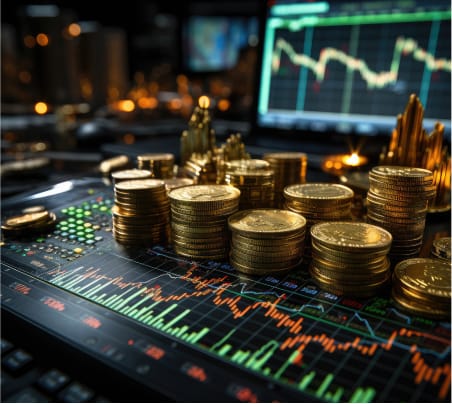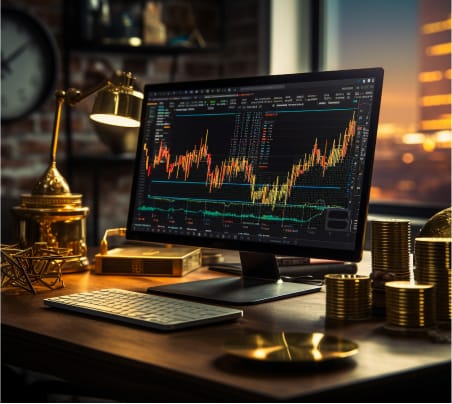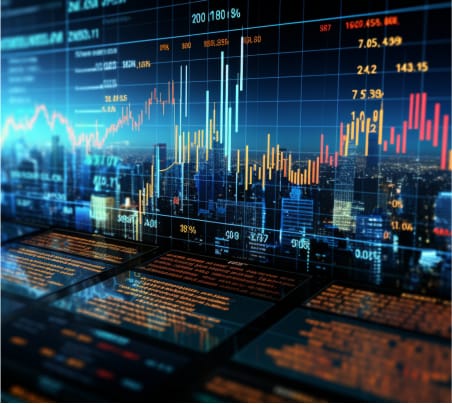Currency exchange is vital in the world's financial system. It helps turn one country's money into another's. This is key for international trade, travel, or buying overseas assets.
Exchange rates change and affect how much things cost when you buy or sell them in other countries. Knowing about currency exchange is crucial. Both companies and regular people need to know this. Price changes can influence financial choices due to changes in the economy or world events.
Key Takeaways
- Currency exchange plays a pivotal role in global finance.
- Exchange rates fluctuate based on various economic factors.
- Understanding currency exchange enhances financial decision-making.
- The forex market is a key player in determining currency values.
- Global trade relies on efficient currency conversion processes.
Introduction to Currency Exchange
Definition of currency exchange means changing one currency to another. This process is key for global business and international travel. Knowing why currency exchange matters is important. It affects prices, profits, and financial choices due to currency value changes.
Currency values change due to several factors. These include how well an economy is doing, political stability, and market guesses. Currency exchange works around currency pairs. This is where one currency's value is compared to another's. Forex markets let people buy and sell these currencies. This understanding helps readers grasp the importance of currency exchange and its role in the global economy.
The Importance of Currency Exchange in Global Trade
The currency exchange impact plays a big role in global trade. Companies working globally depend on it to make dealings across countries easier. This is because trading without a way to swap currencies would be very hard. They'd struggle with setting prices and trading goods in different money.
Currency value changes can change profit levels. For example, if a currency's value falls, it costs more to bring in goods. This situation can affect how things are priced. So, companies need to keep up with these changes. That way, they can set competitive prices everywhere.
To avoid problems from currency changes, being careful is key for businesses worldwide. They can use tactics like hedging to fix exchange rates for later. This moves helps them stay safe from bad shifts in currency prices. Acting early helps keep profits steady in the fast-moving world economy.

To wrap up, getting how currency exchange affects global trade is key. It helps companies deal with the ups and downs of working globally. A smart approach to exchanging currency cuts down risks. Plus, it opens doors for more growth and reaching out into world markets.
Currency Exchange Fundamentals
Getting to know how currency exchange works is key for anyone interested in forex. Basically, it's about swapping one currency for another. This swap lets people and companies do business across borders. In forex, currencies are traded as pairs. This means the value of one currency is shown through another. For example, changing US dollars into euros involves bid/ask prices. These prices show what the market thinks these currencies are worth.
What is Currency Exchange?
Currency exchange lets one currency be turned into another. The forex market is open all week, 24 hours a day. It includes banks, financial groups, companies, and individual traders. Deals are done with currency pairs. This shows the value of one currency compared to another. In the USD/EUR pair, the USD is the base and the EUR is the quote. Knowing about these pairs is vital to trade well and manage risks.
History of Currency Exchange
The story of currency exchange starts with early trade. Back then, goods and services were traded directly in a barter system. As societies grew, there was a need for a common way to trade. Over time, the way we exchange currency reached important milestones. One was creating the gold standard in the 19th century. It linked currencies to gold, making trade stable and predictable. Later, moving to fiat currencies gave governments more power over money and exchange rates.

How Currency Exchange Rates Are Determined
Currency exchange rates change because of many factors. These factors include both market actions and government decisions. It's important to look at different things that can change currency values.
Factors Influencing Currency Exchange Rates
There are several things that can make currency values change. Here are some key points:
- Interest Rates: When interest rates are high, they pull in foreign money. This raises demand for the currency.
- Economic Stability: Stable countries usually have stronger currencies. This happens because investors feel more confident.
- Geopolitical Events: Political troubles or conflicts can make a currency's value go down.
- Inflation Rates: A strong currency often goes hand in hand with low inflation. This shows the currency keeps its buying power well.
- Trade Balances: A country with more exports than imports will likely have a stronger currency.
Role of Central Banks in Currency Valuation
Central banks play a big role in setting exchange rates. They use different ways to affect how much currencies are worth:
- Monetary Policy: These banks change interest rates and control how much money is out there. This can make the economy stable or help it grow, which affects currency value.
- Market Interventions: They can buy or sell a lot of currency. This is done to change its market price when needed.
- Stability Maintenance: By keeping inflation in check and helping the economy grow, central banks help make the currency stronger.

| Factor | Impact on Currency |
|---|---|
| Interest Rates | Higher rates increase demand for currency |
| Economic Stability | Strengthens investor confidence leading to stronger currency |
| Geopolitical Events | Instability leads to depreciation |
| Inflation Rates | Low rates support stronger purchasing power |
| Trade Balances | Positive balances support stronger currency values |
Different Types of Currency Exchange Markets
Learning about currency markets is key for effective foreign exchange trading. There are different markets to fit various needs and risk levels. We have the spot and forward markets, plus over-the-counter (OTC) and exchange-traded markets.
Spot Market vs. Forward Market
The spot market means trading currencies right now at today's prices. It's great for traders needing quick deals. On the other hand, the forward market lets people agree on a currency exchange for a future date. This locks in prices, helping to manage potential price changes.
Over-the-Counter (OTC) vs. Exchange-Traded Markets
OTC trading happens directly between two parties, without a formal exchange's oversight. It's flexible, offering access to many currency pairs. In contrast, exchange-traded markets, like the New York Stock Exchange, have set rules and are regulated. They're known for being transparent and reliable. Choosing the right market type depends on your trading approach and the current market situation. It's vital to understand these differences for better trading outcomes and risk management.













